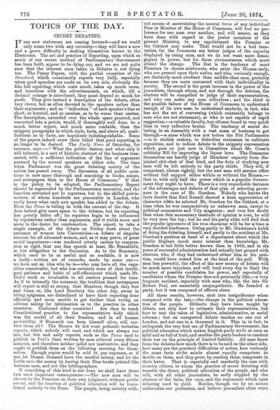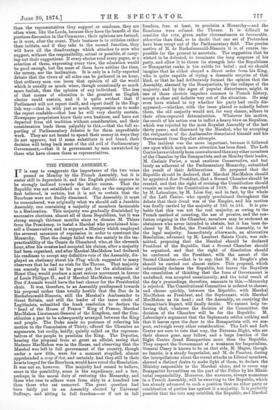TOPICS OF THE DAY.
SECRET DEBATING.
TF any new statesmen are coming forward—and we could I only name two with any certainty—they will have a new and a grave difficulty in making themselves known to the Electorate. The art and practice of Reporting, upon which so much of our recent method of Parliamentary Government has been built, appear to be dying out, and we are not quite sure that the interest once taken in Debates is not dying too. The Penny Papers, with the partial exception of the Standard, which occasionally reports very fully, especially when good speeches are made on its own side, obviously dis- like full reporting, which costs much, takes up much room, and interferes with the advertisements, on which, till a decimal coinage is introduced, they must depend so much for profit. They give instead a description of the debate, often very clever, but as often devoted to the speakers rather than their arguments ; and an " indication " of each speaker's line so short, so hurried, and so careless, as to be worse than useless. The description, extended over the whole space granted, and converted into a précis, would, if thoroughly well done, be a much better report, and much more readable, than the snippety paragraphs in which style, facts, and above all, quali- fications as to facts, are hopelessly indistinguishable. Some of the papers indeed avow their belief that good reporting is no longer to be desired. The Daily News of Saturday, for instance, says :—" What the public desires, and what only it will tolerate, is a sort of historic abstract of the business tran- sacted, with a sufficient indication of the line of argument pursued by the several speakers on either side. The time when Parliament was the great debating society of the nation has passed away. The discussion of all public ques- tions is now more thorough and searching in books, essays, and newspapers than in the House of Commons." If that is the policy to be adopted, the Parliamentary Report should be superseded by the Parliamentary narrative, and the function entrusted not to reporters, but to the skilled precis- writers, of whom hundreds are procurable in London, who really know what each new speaker has added to the debate. Even the Times is falling in with the current of the day. It does indeed give more space to the debates, but its reporting has greatly fallen off ; its reporters begin to be influenced by reputations rather than arguments, and it yields more and more to the desire for condensation. The report, to take a single example, of the debate on Friday week about the entrance of women into ITniversities—a debate of singular interest for all educated women, and, as it may prove, of great social importance—was rendered utterly useless by compres- sion so rigid, that one fine speech at least, Mr. Stansfeld's, is lost altogether to the discussion. As to the Summary, which used to be so useful and so readable, it is now a badly - written set of remarks, made by some one — we have not an idea who he is—who may have all the capa- cities conceivable, but who has certainly none of that intelli- gent patience and habit of self-effacement which made Mr. Dod's work so invaluable to all readers pressed for time. As if to intensify the nuisance, the tradition that newspapers will report is still so strong, that Members, though they fret and fume, or, like Lord Rosebery the other day, swear in biting epigrams, are disinclined to have their reporting done officially, and seem unable to get farther than voting an address asking for information as to the practice in other
countries. Confound other countries Are they to teach Constitutional practice to the representative body which was the model of all their Senates, and in all human probability, if Bismarck can keep himself alive, will sur- vive them all The Houses do not want pedantic verbatim reports,, which nobody will read, and which are always too late, but fair and early reports, such as the Times used to publish in Peel's time, written by men relieved every fifteen minutes, and therefore neither jaded nor inattentive, and they ought to publish them on the following morning for them- selves. Enough copies would be sold to pay expenses, or if not, let Messrs. Hansard have the needful money, and let the Lords save the money by having their Blue-books printed like business men, and not like bibliographers.
If something of this kind is not done, we shall have these two most important consequences :—The new men will be chosen by the Premiers on their own judgment, without public assent, and the function of political education will be trans- ferred entirely to the Press. The people, being entirely with-
out means of ascertaining the mental force of any individual Peer or Member of the House of Commons, will feel no pre- ference for one man over another, and will assent, as they have done with regard to the junior members of the present Ministry, to any appointment the Premier or the Cabinet may make. That would not be a bad inno- vation, for the Commons are better judges of the capacity displayed by rising men, and we do not want mere dema- gogues in power, but for three circumstances which must-
attend the change. The first is the tendency of most Premiers to choose aristocrats, who enter the Houses early, who are pressed upon their notice, and who, curiously enough, are distinctly more obedient than middle-class men, probably because they are more contented with their individuality in society. The second is the great increase in the power of the journalists, through whom, and not through the debates, the electors will be compelled to judge of their representatives, and who can make any man ridiculous ; and the third is the possible failure of the House of Commons to understand enough of its own mm, to understand anybody, in fact, who has not the art of conversing (which constantly belongs to men who are not statesmen), or who is not capable of rapid. suggestion,—a valuable faculty, but oftener found in very quick than in very reflective brains. The tendency of secret de- bating, in an Assembly with a vast mass of business to get through—a mass which was not before the Pitt Parliaments. —is to abolish oratory, to disincline statesmen to cultivate exposition, and to reduce debate to the snippety conversation which goes on just now in Committee about Mr. Cross's. rubbishy Bill for improving the liquor laws. The Commons themselves can hardly judge of Members' capacity from dis- jointed chit-chat of that kind, and the duty of studying new men will be left entirely to the party chiefs. They will, if competent, choose rightly, but the new men will assume office' without full support either within or without the Houses,— that is, with only half the power which in a popular Govern- ment they ought to have. There is a very remarkable instance of the advantages and defects of that plan of selecting gover- nors in the case of Mr. Goschen. Nobody who knows the facts doubts that Earl Russell showed a keen appreciation of character whtn he selected Mr. Goschen for the Cabinet, at a time when he was comparatively an unknown man, except to political economists and City magnates ; and very few doubt that when this momentary lassitude of opinion is over, he will be very near the top ; but he and his party alike will find that the popular ignorance of his true character will be for a time a. very decided hindrance. Owing partly to Mr. Gladstone's habit of doing the debating himself, and partly to the accident of Mr. Goschen's position as head of a department about which the public displays much more interest than knowledge, Mr. Goschen is but little better known than in 1868, and in six, years of successful administration had actually lost ground with electors, who, if they had understood either him or his posi- tion, would have seated him at the head of the poll. With men less powerful, the effect of the new secrecy of debate will be much more injurious, and will tend every day to limit the number of possible candidates for power, and especially of candidates whom the Premier does not personally like,—a very frequent accident, especially with men who, like the late Sir Robert Peel, are essentially unsympathetic. He founded a party, but it was composed of officers alone.
All these results, however, sink into insignificance when compared with the last,—the change in the political educa- tion of the people. Hitherto they have been taught by' debate, not only how to estimate their representatives, but how to test the value of legislative, administrative, or social reforms ; but an unreported debate teaches no one out of London, and not one in a thousand in it. This is, in fact, to extinguish the very first use of Parliamentary Government, the political education which makes English party strife at once so- mild and so full of fruit, and enables the party leaders to conduct their war on the principle of limited liability. All men know- from the debates how much there is to be said on the other side, how many are the practical difficulties of action, how variously the same facts strike minds almost equally competent to- decide on them, and they grow, byreading them, temperate in their hates. That is especially and markedly the case with country editors, to whom the practice of secret debating will transfer the direct political education of the people, and who will, with all other journalists, be sadly crippled by the absence of the facts, the cues, and the arguments which open debating used to yield. Besides, though we by no means undervalue our profession, and believe journalists often wiser
than the representatives they support or condemn, they are often wiser, like the Lords, because they have the benefit of the previous discussion in the Commons ; their opinions are formed, as it were, after the event. Their business is to criticise rather than initiate, and if they take to the second function, they will have all the disadvantage which attaches to men who suggest, without the responsibility, actual or possible, of carry- ing out their suggestions. If every elector read every paper, or a selection of them, expressing every view, the education would be good enough, but the mass of them have neither the time, the money, nor the inclination. It is only in a fully-reported debate that the views of all sides can be gathered in an hour, that ordinary men can learn that opinion of all the world which is usually so much wiser, though occasionally so much more foolish, than the opinion of any individual. The loss of that means of education is the greatest an English elector could sustain, and it is quite evident that if Parliament will not report itself, and report itself in the Eng- lish way—that is, with just so much compression as to make the report readable—that loss he will very shortly sustain. Newspaper proprietors know their own business, and have not departed from old tradition without consideration, and their consideration leads them palpably to this,—that the full re- porting of Parliamentary debates is for them unprofitable work. They are not bound to spend their money in ways they do not approve, but if some substitute is not found, their decision will bring back most of the old evil of Parliamentary Government,—that it is government by men unwatched by those who have chosen them as representatives.



































 Previous page
Previous page